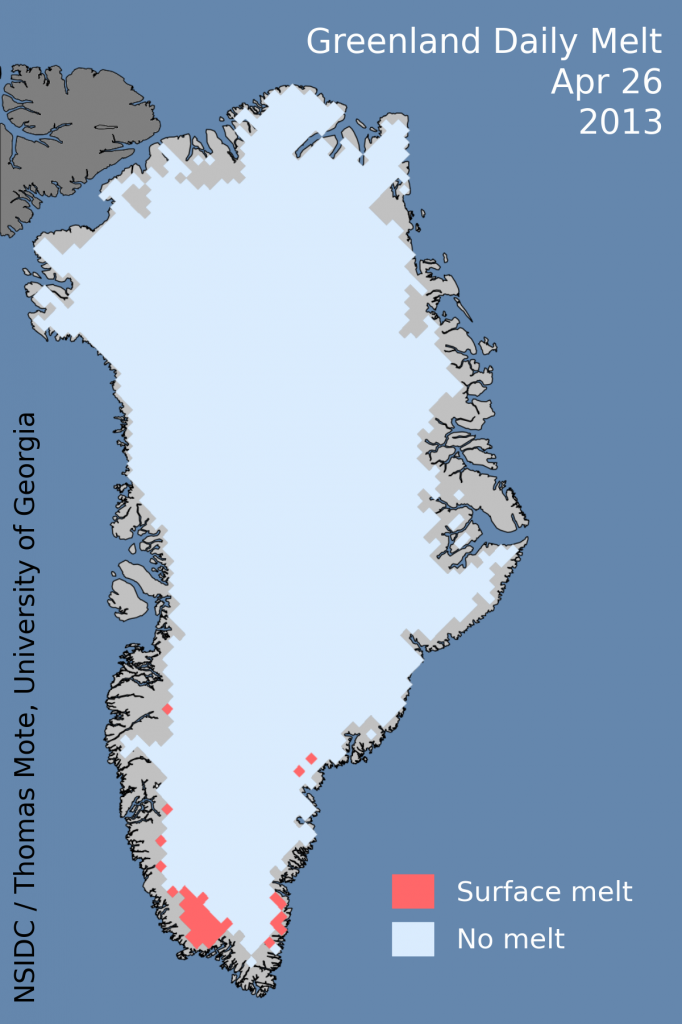April 27, 2013
Abrupt Climate Change in the Arctic: Why Should We Care?
Why should we care about abrupt climate change in the Arctic? Because climate change in the Arctic leads to climate change outside the Arctic, and in particular here in South West England!
Here's a new video that shows one of the "abrupt changes" that's been taking place in the Arctic over the last few years:
You don't need to be a climate scientist to work out that the "Arctic summer sea ice cube" will have all but vanished soon. Once that has happened an even more significant "ice cube" will start melting in earnest instead: The Greenland Ice Sheet. The significance is that when sea ice melts sea levels remain much the same. When ice that's currently over land turns into water in the ocean then sea levels rise.
The already evident changes to our climate and the prospect of sea levels rising more quickly than previously have already prompted the head of the UK's Met Office to declare that "our climate is being disrupted by the warming of the Arctic" and to convene a panel of scientists to try and answer "a really urgent question".
Now comes news from over the soon to be rising pond that another panel of scientists is assembling in the White House to try and answer that question too. According to The West Australian:
In a room at the White House next week, an extraordinary meeting of the brightest minds will attempt to form a strategy to curb climate change's crippling effects on the Arctic.
Amid fears the top of the planet could be free of summer ice within two years, the meeting has been organised by a US brains trust on the Arctic that includes NASA's chief scientist, the director of the US National Science Foundation, representatives from the US Department of Homeland Security and the Pentagon. Joining them in Washington will be Professor Carlos Duarte, a marine scientist from Perth, who is one of 10 researchers from around the world called on to help protect the Arctic.
Professor Duarte recently published his latest research into the effects of a warming Arctic on plankton. According to news from the University of Western Australia:
This research revealed that the two-week spring algal bloom occurring in April as the Arctic emerges from its winter darkness and the sea-ice starts to thin is so productive it can fuel the food web for the entire year and remove significant amounts of CO2 from the atmosphere on an annual basis.
That sounds like it might be good news, but there is more:
Experiments involving temperature manipulations conducted in the Svalbard Islands indicated that the plankton community switches from acting as a sink to acting as a source of CO2 to the atmosphere at seawater temperatures in excess of 5 C. The researchers noted that this temperature will be regularly observed in the European Sector of the Arctic Ocean over the coming decades.
all of which:
Led an international team of researchers to issue a stark warning about the perils the world faces in the near future.
Here's Carlos Duarte's public lecture mentioned in that article, in which he covers a wide range of changes caused by the increase in the Arctic Ocean temperature apart from just those to the spring algal bloom. He also discusses the abrupt onset of melting of the Greenland Ice Sheet last summer for example:
In conclusion, here's what the Greenland Ice Sheet melting map looks like at the moment:
I wonder what solutions to the "urgent problem" of "abrupt climate change" those two "brains trusts" will come up with?
Filed under Climate by

Comments on Abrupt Climate Change in the Arctic: Why Should We Care? »
Living The Question – “Are You Worried About the Arctic Sea Ice?” |Marketing Dreams @ 8:47 pm
[…] "Are you worried about the Arctic Sea Ice", because that's a subject I think everybody should be interested in at the very least, although very few people actually seem to […]
In a rather different take on Carlos Duarte's recent trip to Washington, The Alaska Dispatch reports that: